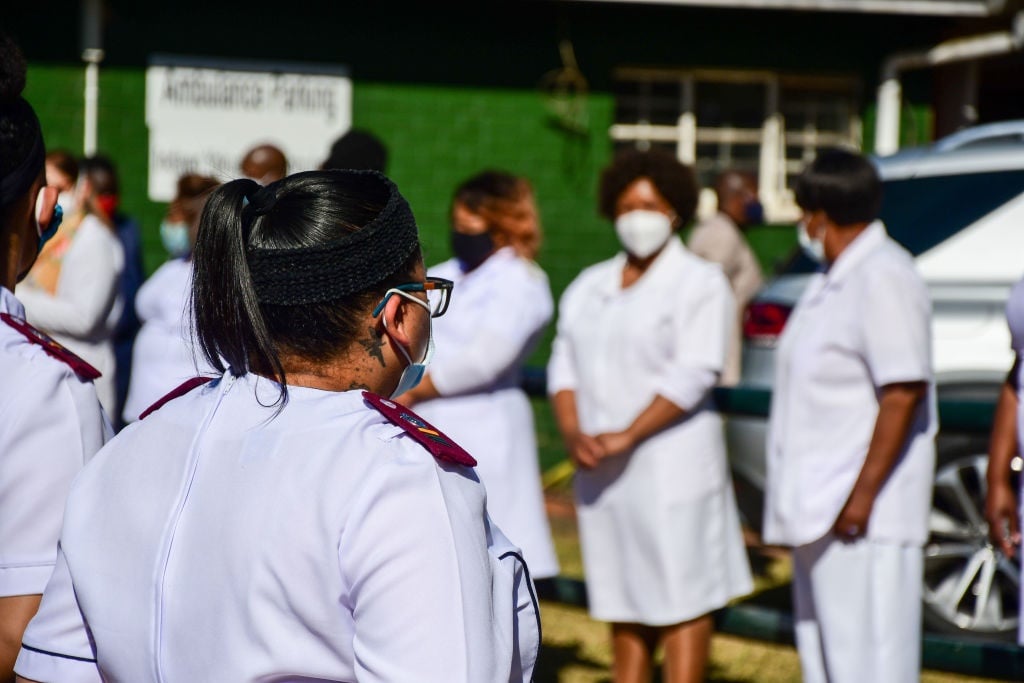


Nurses at a quarantine centre for Covid-19.
- A Middelburg woman left home in fear of being victimised after testing positive for Covid-19.
- A local councillor says stigma around Covid-19 is getting worse in the area.
- People are demanding the government tell them on which street infected community members live.
Stigma surrounding Covid-19 has affected one Middelburg woman, who claims she was victimised by her family and had to move to a neighbouring town after she tested positive.
Nomawethu*, a 38-year-old woman from Middelburg, has been living in a shack in Cradock, self-isolating for three weeks.
She is unemployed with two children, and tested positive after she went to Wilhelm Stahl Hospital with flu-like symptoms.
In an interview with News24, Nomawethu said she did not know how she contracted the virus.
“When I went to hospital, I didn’t make anything of it. I was just sick. I thought it’s a cold and I needed medicine.”
When she arrived at the hospital, her temperature was high, she said.
“They told me I needed to test for coronavirus.”
Days later, she discovered that she was infected with Covid-19 and had to go into quarantine.
“When I found out, I immediately called my sister at home. I was so scared, I just needed my older sister to comfort me.”
Instead of comfort, Nomawethu said she was told her clothes would be waiting for her at the gate.
“I had no one. The word spread that I was infected and no one wanted to help me. I was even threatened. I could see that if I stayed, I would be victimised. I don’t know what people would have done. I packed my bags and moved to Cradock to get help.”
She said she was told by the hospital of a quarantine site in the town.
“I didn’t feel safe there. I just didn’t want to stay in a place where people are dying. I decided to go to Cradock to live with my boyfriend,” she said.
Nomawethu said she has fully recovered.
READ | Concerns mount over Covid-19 stigma in KwaZulu-Natal
Nomawethu said:
The stigma is bad. People think that if you have coronavirus, you will kill them.
“Some people turn away or run to the other side of the street when they see you. Even in Cradock, there are people who don’t want to be around me.”
DA councillor Handri Vorster said little Covid-19 information is disseminated to the community of Middelburg.
“It’s mostly because people are afraid and the lack of communication. They don’t know what the truth is. Social media plays a very big role. Fake news is also very dangerous.”
Vorster said the stigma around the virus has become so bad that community members are not satisfied with the daily statistics from the government.
“In the nine wards in Middelburg, the stats are distributed every day, but the public want to know where the people live. The department and the municipality release stats in each of the nine wards. That is not good enough. The latest request now is to put pressure on the mayor and the department to give the street names. When we ask, why do you want the street names, they say we want to know which street to avoid. That is the latest craze. They want to pinpoint the location where everyone is living,” she said.
A community member in Lusaka, Tumeka Bolani, said she knew very little about Covid-19.
“They don’t come to us, we only get informed when we go to clinics. At the clinics, they tell us not to treat people infected differently. I know that I have to wear a mask and sanitise. People get this information at the clinic.”
Bolani said older people in the community do not know about the virus.
“We hear on Facebook that there are helicopters that will come and douse us with sanitisers. Our elders are scared. As young people, we are also scared because we don’t know enough about this virus.”
*Not her real name

